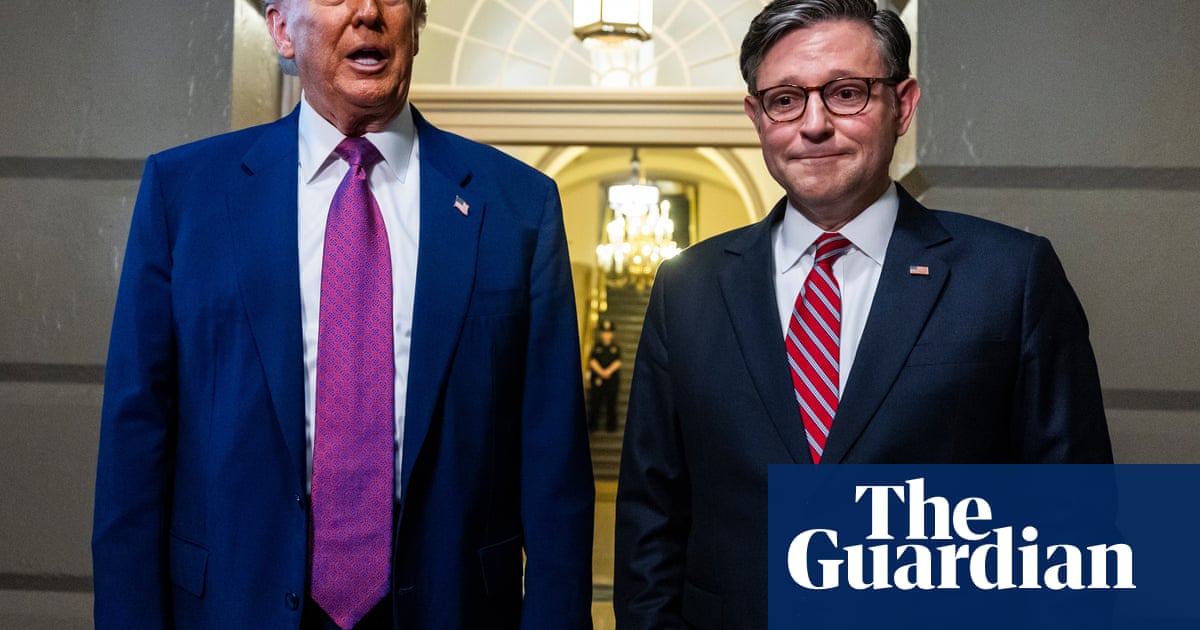Donald Trumptraveled to the Capitol on Tuesday to insist that the fractious House Republican majority set aside their differences and pass his wide-ranging bill to enact his taxation and immigration priorities.
In a speech to a closed-door meeting ofRepublicanlawmakers in Congress’s lower chamber, the president pushed representatives from districts in blue states to drop their demands for a bigger State and Local Tax (Salt) deduction, and also sought to assuage moderates concerned that the legislation, known as the One Big Beautiful Bill Act, would hobble the Medicaid health insurance program.
“I think we have unbelievable unity. I think we’re going to get everything we want, and I think we’re going to have a great victory,” Trump said as he left the meeting.
But it is unclear if the president’s exhortations had the intended effect ahead of the Monday deadline House speaker Mike Johnson has set to get the bill passed through the chamber, whichRepublicanscontrol by a mere three votes. Following his meeting, at least one key lawmaker said he remained opposed to the bill as written, while others announced no changes to their position.
“As it stands right now, I do not support the bill,” said New York congressman Mike Lawler, one of the Republicans representing districts in Democratic-led states that are demanding a restored Salt deduction.
The next test of the bill’s prospects is scheduled for 1am on Wednesday, when the rules committee convenes for a procedural vote that, if successful, clears the way for consideration of the measure by the fullHouse of Representatives.
The nearly 1,100-page legislation is Trump’s top priority in Congress, and would codify several of his campaign promises, including making permanent or extending tax cuts enacted during his first term, temporarily ending the taxation of tips and overtime and paying for a wall along the border with Mexico and the mass deportations of undocumented immigrants.
To offset its costs, House Republicans have approved slashing federal safety net programs like Medicaid, which covers poor and low income Americans, and the Supplemental Nutrition Assistance Program (Snap). But even with those cuts, the bill is estimated to cost $3.8tn through 2034, rankling rightwing fiscal hardliners who want to see the measure reduce the government’s large budget deficit.
Johnson and other Republican leaders have spent weeks trying to square their demands with the blue-state Republicans and moderates wary of slashing safety net programs. As he arrived at the Capitol on Tuesday morning, Trump quickly made it known who he favored in the negotiations, insisting that “we’re not touching” Medicaid and that cuts would only hit “waste, fraud and abuse”.
While Salt taxes were once deductible on federal returns, the tax cuts Trump signed in 2017 did away with that. The president said he opposed restoring the deduction, because “we don’t want to benefit Democrat governors.”
At his meeting with lawmakers, “He was emphatic, we need to quit screwing around. That was the clear message. You all have tinkered enough, it is time to land the plane,” South Dakota congressman Dusty Johnson told reporters.
“Ninety-eight percent of that conference is ready to go. They were enthused. They were pumped up by the president, and I think with the holdouts, he did move them. I don’t know that we are there yet, but that was a hugely impactful meeting.”
Under the bill, Medicaid would receivea $715bn budget reduction, mostly by imposing work requirements on recipients. After the meeting, Don Bacon, a Nebraska moderate whohad warnedagainst cutting Medicaid too deeply, signaled approval of the bill, saying: “We did as well as we could do.”
But David Valadao, whose central California district has one of the large shares of Medicaid recipients nationwide, said he was “very concerned” about the impact of the cuts.
The Democratic minority is largely powerless to stop the bill from advancing in the House, and the GOP’s use of the budget reconciliation procedure means the bill cannot be blocked by a filibuster in the Senate. Democratic House minority leader Hakeem Jeffries and James McGovern, the ranking member on the rules committee, called for the panel’s consideration of the bill to be rescheduled, noting it is currently set to take place “during the dead of night”.
“It is deeply troubling that you would attempt to jam this legislation down the throats of the American people. What else are you hiding? It is imperative that you immediately reschedule the meeting so that it may be debated in the light of day,” they wrote in a letter to Johnson and the rules committee’s Republican chair.
House GOP leaders cast the president’s visit as a sign to their members that it was time to stop quibbling.
Majority leader Steve Scalise told a press conference after Trump departed: “President Trump had a strong and clear message to a packed House Republican conference, and that is, after months of long, intense discussions over really important differences and issues, this One Big, Beautiful Bill has come through the committee process, and it’s time to end the negotiations, unify behind this bill and get it passed on to the Senate.”
Yet it was plain that there are kinks left to iron out. Johnson declined to take questions at the press conference, saying he had to leave to “gather up the small subgroups in the House Republican Conference and tie up the remaining loose ends. I’m very confident that we’ll be able to do that.”
